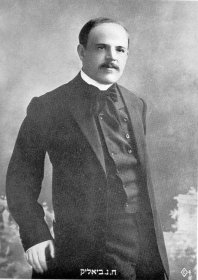

This important collection gathers together five essays by Haim Nahman Bialik (1873-1934), by all accounts the greatest of modern Hebrew poets, and one who has long defied translation.
A key figure in the renascence of Hebrew culture at the beginning of the twentieth century, Bialik was a complicated, paradox-ridden personality whose vision spanned the entirety of Jewish learning and literature. His poetry is remarkable for its nearly irreconcilable combination of an intensely private lyricism and a confrontational, prophetic public verse. Largely against his will, he came to be regarded as the “national poet,” albeit of a people without a nation. To this day in Israel, his name is virtually synonymous with Hebrew culture. Bialik’s genius spilled over into other areas as well, including fiction, essay writing, and editing. He oversaw the “ingathering” of major works from the Jewish past, and, in the essays collected here, set forth a dynamic, binary vision of Jewish thought that stunningly transcends the parochial.
Poet Zali Gurevitch’s informative and probing afterword sketches the poet as he was in his life and his poems, and as he has remained — a legendary force in the ongoing development of Hebrew literature. This volume, which contains seminal works such as the magisterial “Revealment and Concealment in Language,” “Halachah and Aggadah,” and “Jewish Dualism,” is the first collection of Bialik’s essays to be published in English.
“… a new handsomely produced English edition…[of] a series of highly influential essays on Hebrew and Jewish culture….[Bialik’s] range is historical, philosophical, anthropological, plumbing the vast depths of his Jewish learning.”
The Times Literary Supplement
“The essays in this volume treat questions of language, history, and faith with dazzling intellectual penetration.”
Adam Kirsch
The New York Sun
*
“Every day, consciously and unconsciously, human beings scatter heaps of words to the wind, with all their various associations; few men indeed know or reflect on what these words were like in the days when they were at the height of their power. Many of these words came into the world only after difficult and prolonged birth pangs endured by many generations. Others flashed like sudden lightning to illuminate, with one leap, a complete world. Many were paths through which living hosts passed, each leaving behind its shadow and aroma…. But there came a day when these same words, having fallen from their height, were thrown aside, and now people wallow in them as they chat, as casually as one wallows in grass….
What is there to wonder at? This: the feeling of security and the satisfaction that accrue to human beings when they speak, as though they are really leading their thoughts or feelings beside the still waters and across the iron bridge of the Messiah, without their having any conception of how shaky is their bridge of mere words, how deep and dark the void is that opens at their feet, and how much every step taken safely partakes of the miraculous.”
from “Revealment and Concealment in Language”
HAIM NAHMAN BIALIK was born in 1873 in the Ukrainian village of Radi. He studied at the renowned Volozhin Yeshiva in Lithuania, and eventually moved to Odessa. In 1924 he settled in Tel Aviv, where he spent the rest of his life. He is widely acknowledged as the one of the greatest Jewish cultural figures of his age.
ZALI GUREVITCH is the author of seven books of poetry. He teaches at the Hebrew University in Jerusalem.
Paperback $15.95 142 pages ISBN 965-90125-0-0
This book is no longer in print.